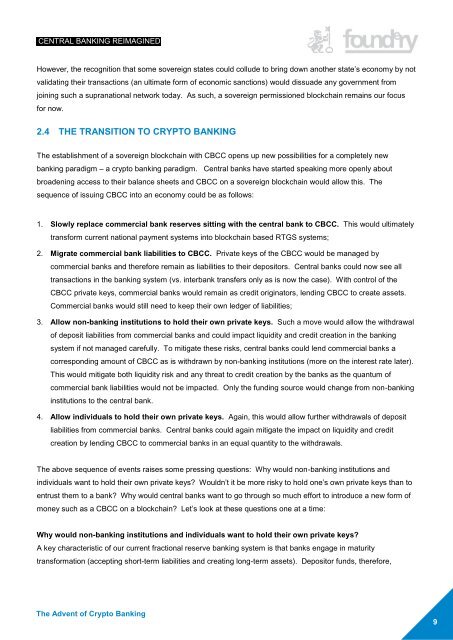The Advent of Crypto Banking
The_Advent_of_Crypto_Banking
The_Advent_of_Crypto_Banking
Create successful ePaper yourself
Turn your PDF publications into a flip-book with our unique Google optimized e-Paper software.
CENTRAL BANKING REIMAGINED<br />
However, the recognition that some sovereign states could collude to bring down another state’s economy by not<br />
validating their transactions (an ultimate form <strong>of</strong> economic sanctions) would dissuade any government from<br />
joining such a supranational network today. As such, a sovereign permissioned blockchain remains our focus<br />
for now.<br />
2.4 THE TRANSITION TO CRYPTO BANKING<br />
<strong>The</strong> establishment <strong>of</strong> a sovereign blockchain with CBCC opens up new possibilities for a completely new<br />
banking paradigm – a crypto banking paradigm. Central banks have started speaking more openly about<br />
broadening access to their balance sheets and CBCC on a sovereign blockchain would allow this. <strong>The</strong><br />
sequence <strong>of</strong> issuing CBCC into an economy could be as follows:<br />
1. Slowly replace commercial bank reserves sitting with the central bank to CBCC. This would ultimately<br />
transform current national payment systems into blockchain based RTGS systems;<br />
2. Migrate commercial bank liabilities to CBCC. Private keys <strong>of</strong> the CBCC would be managed by<br />
commercial banks and therefore remain as liabilities to their depositors. Central banks could now see all<br />
transactions in the banking system (vs. interbank transfers only as is now the case). With control <strong>of</strong> the<br />
CBCC private keys, commercial banks would remain as credit originators, lending CBCC to create assets.<br />
Commercial banks would still need to keep their own ledger <strong>of</strong> liabilities;<br />
3. Allow non-banking institutions to hold their own private keys. Such a move would allow the withdrawal<br />
<strong>of</strong> deposit liabilities from commercial banks and could impact liquidity and credit creation in the banking<br />
system if not managed carefully. To mitigate these risks, central banks could lend commercial banks a<br />
corresponding amount <strong>of</strong> CBCC as is withdrawn by non-banking institutions (more on the interest rate later).<br />
This would mitigate both liquidity risk and any threat to credit creation by the banks as the quantum <strong>of</strong><br />
commercial bank liabilities would not be impacted. Only the funding source would change from non-banking<br />
institutions to the central bank.<br />
4. Allow individuals to hold their own private keys. Again, this would allow further withdrawals <strong>of</strong> deposit<br />
liabilities from commercial banks. Central banks could again mitigate the impact on liquidity and credit<br />
creation by lending CBCC to commercial banks in an equal quantity to the withdrawals.<br />
<strong>The</strong> above sequence <strong>of</strong> events raises some pressing questions: Why would non-banking institutions and<br />
individuals want to hold their own private keys? Wouldn’t it be more risky to hold one’s own private keys than to<br />
entrust them to a bank? Why would central banks want to go through so much effort to introduce a new form <strong>of</strong><br />
money such as a CBCC on a blockchain? Let’s look at these questions one at a time:<br />
Why would non-banking institutions and individuals want to hold their own private keys?<br />
A key characteristic <strong>of</strong> our current fractional reserve banking system is that banks engage in maturity<br />
transformation (accepting short-term liabilities and creating long-term assets). Depositor funds, therefore,<br />
<strong>The</strong> <strong>Advent</strong> <strong>of</strong> <strong>Crypto</strong> <strong>Banking</strong><br />
9


